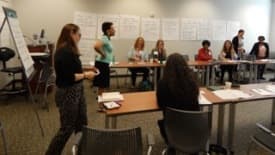
The ADVANCE Faculty Affairs and Diversity Office recently welcomed “The Op-Ed Project” to UNC Charlotte. The two-day workshop focused on enlarging the pool of women and underrepresented minority experts who are accessing opinion forums and discovering effective ways to "get their feet in the door of the idea marketplace."
Held on May 14-15, the workshop was attended by 17 members of the UNC Charlotte community, including department chairs, faculty members, directors and staff. Participants were introduced to the mechanics of writing and pitching an effective op-ed piece, but the workshop facilitators had a larger goal in mind. The overall theme was empowering women and underrepresented minorities to use their voices to contribute to the world's narrative.
Facilitators used thought experiments, high-stakes scenarios and games to explore the concepts of credibility, persuasion and building consensus. Participants also were challenged to think about themselves in new ways, expanding the definition of expertise as it relates to themselves, and to think about why it is crucial for them to "get their feet in the door of the idea marketplace."
The workshop leaders focused on why they believe it is important for women and underrepresented minorities to contribute to the world dialogue. The range of opinions is extremely narrow and comes from a tiny fraction of the world’s population: mostly western, white, older, privileged and overwhelmingly, that is 85 percent male. A May 2008 Rutgers University study found that 97 percent of the op-eds by scholars that appeared in the Wall Street Journal were written by men. In addition, some 84 percent of the guests on Sunday morning TV political talk shows were men.
Numerous studies have provided compelling evidence that diversity is critical for an organization to be innovative, which is a requirement to stay relevant in a fast changing world. A Forbes study recently identified diversity and inclusion as a key driver of internal innovation and business growth. ADVANCE Office officials noted the importance of looking at the world's problems through multiple lenses that reflect a diversity of perspectives, experiences, cultures, genders and age. They added much could be accomplished on the world stage if the University invested in this missing intellect.
Seasoned journalists, Chloe Angyal and Mary Curtis, led the workshops. Angyal, a writer and commentator from Sydney, Australia, who is based in New York City, is a senior columnist at Feministing and an opinion contributor at Reuters. Her writing about politics and popular culture has been published in the Washington Post, The Atlantic, Los Angeles Times, The Guardian, Jezebel, Slate and Salon. She is a regular guest on MSNBC and Al Jazeera English.
Curtis is an award-winning multimedia journalist based in Charlotte. She contributes to the Washington Post “She the People” blog, TheGrio.com, TheRoot.com, NPR and Creative Loafing. Curtis, who covers politics, culture and race, has appeared on public broadcasting’s “All Things Considered” and “Here & Now.” Curtis also appears weekly on TV’s WCCB News Rising Charlotte. She has worked at the New York Times, where she helped create “The Living Arts” section in the national edition; the Charlotte Observer, as executive features editor and syndicated columnist; the Baltimore Sun; Associated Press; and as national correspondent for AOL’s PoliticsDaily.com.
Anita Blanchard, an associate professor of psychology and organization science at UNC Charlotte, summed up her experience as a participant in the workshop: “My experience in the Op-Ed Project workshop at UNC Charlotte made me seriously think about a new future for myself,” she said. “I’m not going to change careers; I love being a professor. But all of a sudden, I feel like a new and very attractive avenue in my career has just opened up. I never thought about writing as a social responsibility, a thing that could be of value to others. But, I know things. I have things I’d like to say. And I want to say them. So with a bit of confidence building, insight into writing op-eds, some training for live discussions and a lot of peer support, I am ready to see what is next along this path.”
Terre Lucas, director of Building Educational Strengths and Talents in the University Center for Academic Excellence, added: “The Six Degrees of Separation theory would have us to believe that the world is really small because each of us is five or six people away from meeting anyone we’d like. I contend that the world is small because we are so focused on meeting that person or achieving that goal. We fail to value the experiences to be gleaned from the five or six people we meet along the way. Their perspectives can help us to grow beyond our comfort zone.
“The Op-Ed Project slowed life down long enough to give me seventeen opportunities to step out of my comfort zone and see my colleagues differently,” Lucas said. “More importantly, it provided me with the confidence and an outlet to express myself in a meaningful way so that my experiences can be a catalyst for others.”